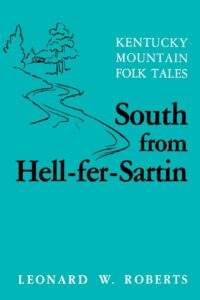NOTE: THIS WEBSITE IS A WORK IN PROGRESS. RESOURCES AND DATA ARE ADDED DAILY.
IMPORTANT: We are in urgent need of funding to keep this project alive and ensure its future. If you’re enjoying the site and see our vision for the project, please consider contributing to the Melungeon Roots crowdfunding campaign today. It is only with your help that we can continue this work. MORE INFO / DONATE
Thanks so much for your support! – Jes
![]()
South from Hell-fer-Sartin: Kentucky Mountain Folk Tales
share:
Some buttons on this page link to external websites. If you visit one of our affiliate sites and make a purchase, I may receive a small commission at no extra cost to you. More info
- UPDATED: 6.29.2025
- regional
- culture, folklore, storytelling, isolated region
author:
Leonard W. Roberts
editor:
n/a
publisher:
date:
1988
ISBN:
9780813101750
pages:
296
notes:
contents:
description:
To a people who, at that time, watched dancing hearth fires more often than television, the adventures of Jack in the land of witches and giants, monsters and beautiful princesses, provided first-class entertainment. Here are such old favorites as "Sleeping Beauty" and "The Golden Arm," retold in the idiom of the Kentucky mountains. Here are hauntingly beautiful cantes fables and earthy Irishman jokes. Here are encounters with Indians and marvelous hunting escapades.
Roberts introduces his collection, first published in 1955, with a sympathetic description of the mountain way of life. He notes especially the bewildering and rapid changes that came to the Pine Mountain watershed in that decade as the highways and electric lines at last brought in a sophistication that preferred the soap opera to the folk tale. Although the stories Roberts recorded were still a firm part of folk tradition at the time, he believed that within a decade or two they would be forgotten―a prediction, sadly, by now no doubt fulfilled.
Any lover of the vanishing art of tale telling will relish this rich treasury of folklore and humor. Full notes on sources, types, motifs, parallels, and possible origins of the tales make this collection valuable also for folklorists.
CMOS:
author-date:
Other Resources
- Redbone Chronicles
- Gullah Cultural Legacies: A Synopsis of Gullah Traditions, Customary Beliefs, Art Forms and Speech on Hilton Head Island and Vicinal Sea Islands in South Carolina and Georgia
- Big Stone Gap
- Witchcraft in Colonial Virginia
- GodPretty in the Tobacco Field
- The Electronic Front Porch: An Oral History of the Arrival of Modern Media in Rural Appalachia and the Melungeon Community

